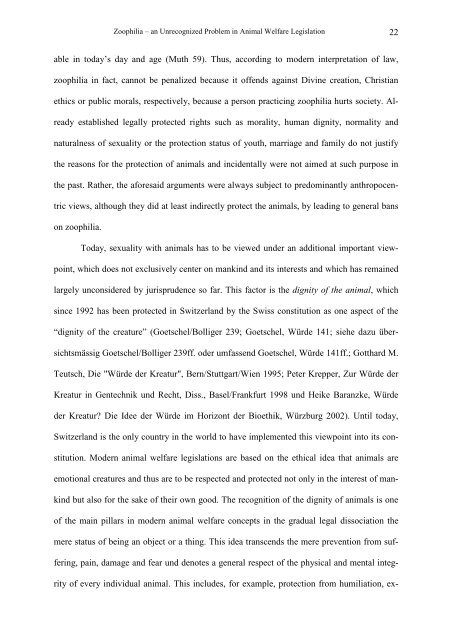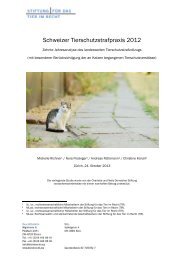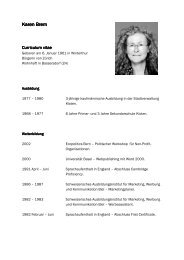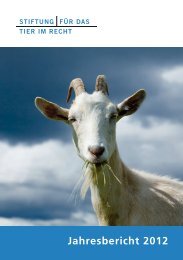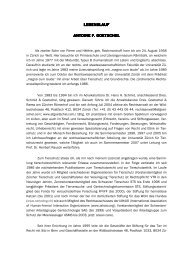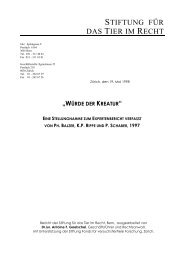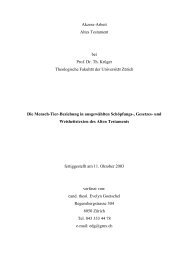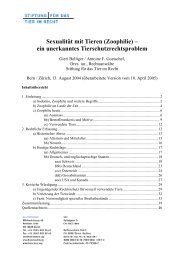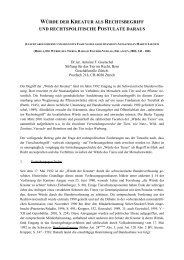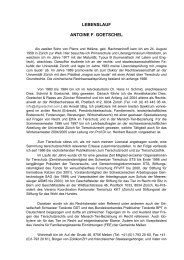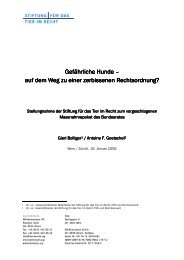Zoophilia an Unrecognized Problem in Animal Welfare Legislation
Zoophilia an Unrecognized Problem in Animal Welfare Legislation
Zoophilia an Unrecognized Problem in Animal Welfare Legislation
You also want an ePaper? Increase the reach of your titles
YUMPU automatically turns print PDFs into web optimized ePapers that Google loves.
<strong>Zoophilia</strong> – <strong>an</strong> <strong>Unrecognized</strong> <strong>Problem</strong> <strong>in</strong> <strong>Animal</strong> <strong>Welfare</strong> <strong>Legislation</strong><br />
able <strong>in</strong> today’s day <strong>an</strong>d age (Muth 59). Thus, accord<strong>in</strong>g to modern <strong>in</strong>terpretation of law,<br />
zoophilia <strong>in</strong> fact, c<strong>an</strong>not be penalized because it offends aga<strong>in</strong>st Div<strong>in</strong>e creation, Christi<strong>an</strong><br />
ethics or public morals, respectively, because a person practic<strong>in</strong>g zoophilia hurts society. Al-<br />
ready established legally protected rights such as morality, hum<strong>an</strong> dignity, normality <strong>an</strong>d<br />
naturalness of sexuality or the protection status of youth, marriage <strong>an</strong>d family do not justify<br />
the reasons for the protection of <strong>an</strong>imals <strong>an</strong>d <strong>in</strong>cidentally were not aimed at such purpose <strong>in</strong><br />
the past. Rather, the aforesaid arguments were always subject to predom<strong>in</strong><strong>an</strong>tly <strong>an</strong>thropocen-<br />
tric views, although they did at least <strong>in</strong>directly protect the <strong>an</strong>imals, by lead<strong>in</strong>g to general b<strong>an</strong>s<br />
on zoophilia.<br />
Today, sexuality with <strong>an</strong>imals has to be viewed under <strong>an</strong> additional import<strong>an</strong>t view-<br />
po<strong>in</strong>t, which does not exclusively center on m<strong>an</strong>k<strong>in</strong>d <strong>an</strong>d its <strong>in</strong>terests <strong>an</strong>d which has rema<strong>in</strong>ed<br />
largely unconsidered by jurisprudence so far. This factor is the dignity of the <strong>an</strong>imal, which<br />
s<strong>in</strong>ce 1992 has been protected <strong>in</strong> Switzerl<strong>an</strong>d by the Swiss constitution as one aspect of the<br />
“dignity of the creature” (Goetschel/Bolliger 239; Goetschel, Würde 141; siehe dazu über-<br />
sichtsmässig Goetschel/Bolliger 239ff. oder umfassend Goetschel, Würde 141ff.; Gotthard M.<br />
Teutsch, Die "Würde der Kreatur", Bern/Stuttgart/Wien 1995; Peter Krepper, Zur Würde der<br />
Kreatur <strong>in</strong> Gentechnik und Recht, Diss., Basel/Fr<strong>an</strong>kfurt 1998 und Heike Bar<strong>an</strong>zke, Würde<br />
der Kreatur? Die Idee der Würde im Horizont der Bioethik, Würzburg 2002). Until today,<br />
Switzerl<strong>an</strong>d is the only country <strong>in</strong> the world to have implemented this viewpo<strong>in</strong>t <strong>in</strong>to its con-<br />
stitution. Modern <strong>an</strong>imal welfare legislations are based on the ethical idea that <strong>an</strong>imals are<br />
emotional creatures <strong>an</strong>d thus are to be respected <strong>an</strong>d protected not only <strong>in</strong> the <strong>in</strong>terest of m<strong>an</strong>-<br />
k<strong>in</strong>d but also for the sake of their own good. The recognition of the dignity of <strong>an</strong>imals is one<br />
of the ma<strong>in</strong> pillars <strong>in</strong> modern <strong>an</strong>imal welfare concepts <strong>in</strong> the gradual legal dissociation the<br />
mere status of be<strong>in</strong>g <strong>an</strong> object or a th<strong>in</strong>g. This idea tr<strong>an</strong>scends the mere prevention from suf-<br />
fer<strong>in</strong>g, pa<strong>in</strong>, damage <strong>an</strong>d fear und denotes a general respect of the physical <strong>an</strong>d mental <strong>in</strong>teg-<br />
rity of every <strong>in</strong>dividual <strong>an</strong>imal. This <strong>in</strong>cludes, for example, protection from humiliation, ex-<br />
22


